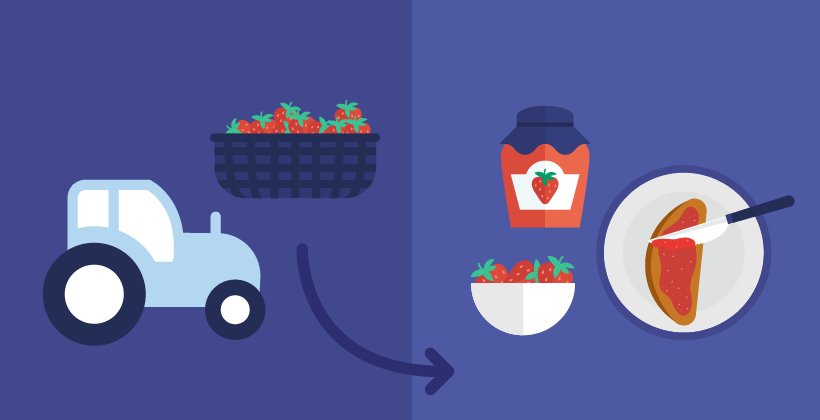Sustainability has become a paramount consideration in various industries, and the food sector is no exception. From the cultivation of ingredients on the farm to the final consumption at the table, the journey of food products involves a complex supply chain. This article explores the concept of sustainability in food supply chains, examining the challenges, initiatives, and the positive impact it can have on both the environment and consumers.
Understanding the Food Supply Chain:

1. Farmers and Producers
The journey begins with farmers and producers. Sustainable agriculture practices focus on minimizing environmental impact, promoting biodiversity, and ensuring the well-being of agricultural workers. This involves responsible land management, water conservation, and the use of organic farming methods to reduce reliance on synthetic chemicals.
2. Processing and Manufacturing
After harvesting, raw ingredients undergo processing and manufacturing. Sustainable practices in this phase include energy-efficient processing methods, waste reduction, and the utilization of eco-friendly packaging materials. Manufacturers are increasingly adopting circular economy principles to minimize waste and enhance resource efficiency.
3. Distribution and Logistics
The efficient distribution of food products is a critical aspect of sustainability. Companies are optimizing transportation routes, investing in fuel-efficient vehicles, and adopting technology to reduce the carbon footprint of distribution networks. Cold chain logistics are also evolving to ensure the preservation of perishable goods without excessive energy consumption.
4. Retail and Consumer Choices
At the retail level, consumer choices play a pivotal role in promoting sustainability. Retailers are emphasizing the importance of eco-friendly packaging, providing information on the sourcing of products, and offering options that align with ethical and environmental considerations. Consumer demand for sustainable products is a driving force influencing the entire supply chain.
Challenges in Achieving Sustainability:

1. Global Supply Chain Complexity
The complexity of global food supply chains presents challenges in implementing sustainability practices. With ingredients sourced from various regions, coordination and standardization of sustainable practices can be challenging. Collaboration among stakeholders on a global scale is essential for meaningful change.
2. Balancing Economic Pressures
Balancing economic pressures with sustainability goals is a delicate act. While sustainable practices can incur additional costs, companies need to find a balance that ensures profitability while prioritizing ethical and environmentally friendly approaches. Long-term benefits often offset initial investments.
3. Consumer Education and Awareness
Consumer understanding of sustainability varies, and there's a need for increased education and awareness. Clear labeling, certification programs, and transparent communication about sustainable practices empower consumers to make informed choices that align with their values.
Initiatives and Positive Impact:

1. Certification Programs
Certification programs, such as organic, Fair Trade, and Rainforest Alliance, play a crucial role in verifying and promoting sustainable practices. These certifications provide consumers with assurance that the products they choose meet specific environmental and ethical standards.
2. Technological Innovations
Technological innovations are aiding sustainability efforts in food supply chains. Blockchain technology, for example, enables transparent and traceable supply chains, allowing consumers to verify the journey of their food products from farm to fork. IoT devices assist in monitoring and optimizing various stages of the supply chain.
3. Circular Economy Practices
Adopting circular economy practices involves minimizing waste and maximizing resource efficiency. This includes recycling packaging materials, repurposing by-products, and designing products for easy disassembly and recycling. Companies committed to circular economy principles contribute to a more sustainable food system.
Consumer Empowerment and Future Outlook:
1. The Power of Conscious Consumerism
As consumers become more conscious of the environmental and social impact of their choices, they wield significant influence. By supporting sustainable practices through their purchasing decisions, consumers contribute to a shift in the entire food industry towards greater sustainability.
2. Collaborative Efforts for Change
Achieving sustainability in food supply chains requires collaborative efforts. Governments, businesses, farmers, and consumers must work together to implement and support initiatives that prioritize environmental stewardship, social responsibility, and economic viability.
Conclusion:
From the farm to the fork, the journey of food involves a complex web of activities, and embracing sustainability is crucial at every stage. The challenges are significant, but the positive impact of sustainable practices on the environment, communities, and the long-term viability of the food industry makes it a journey worth undertaking.
In conclusion, the future of food supply chains lies in the hands of stakeholders who prioritize sustainability, recognize the interconnectedness of global systems, and work towards a more responsible and resilient food system.
FAQs -
Q. What is sustainable agriculture in the context of food supply chains?
Ans: Sustainable agriculture in food supply chains focuses on minimizing environmental impact, promoting biodiversity, and ensuring the well-being of agricultural workers. It involves responsible land management, water conservation, and the use of organic farming methods.
Q. How can consumers contribute to sustainability in food supply chains?
Ans: Consumers can contribute to sustainability by making conscious choices, supporting products with certifications such as organic or Fair Trade, and advocating for transparent and eco-friendly practices. Their purchasing decisions influence the entire supply chain.
Q. What are some challenges in achieving sustainability in food supply chains?
Ans: Challenges include the complexity of global supply chains, balancing economic pressures with sustainability goals, and the need for consumer education and awareness. Coordinated efforts among stakeholders are essential for meaningful change.
Q. What initiatives promote sustainability in food supply chains?
Ans: Certification programs like organic, Fair Trade, and Rainforest Alliance, technological innovations such as blockchain for transparent supply chains, and circular economy practices that minimize waste contribute to sustainability in food supply chains.
Q. How does the future outlook of food supply chains align with sustainability?
Ans: The future of food supply chains relies on stakeholders prioritizing sustainability, collaborating for change, and recognizing the interconnectedness of global systems. Conscious consumerism and initiatives that promote environmental stewardship are integral to a more sustainable food system.






